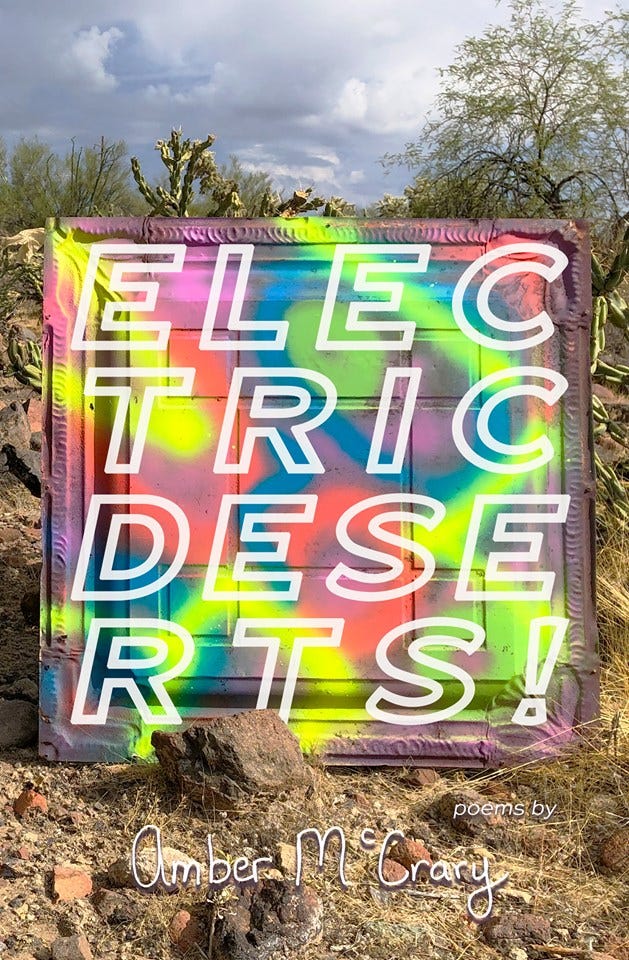
There’s an aesthetic: write the poem white people want you to write or write the poems academics want you to write. Then, there’s Amber McCrary’s chapbook, Electric Deserts, stepping away from both sets of expectations. Here is this defiant othering, crisp lines written for Native eyes. Poems reaching off the page, accessible to relatives.
Here is this defiant othering, crisp lines written for Native eyes. Poems reaching off the page, accessible to relatives.
This book isn’t high brow inaccessible fluff. McCrary is better than that, listening to her cadence in the way of a woman raised on punk. Disjointed musicality and depth driven into ordinary tongue. Slipping from proper sentence-case, dropping into lower case, the reader is given a line to follow in how to approach the text.
In the English language, structure is denotes importance, McCrary capitalizes on this lesson in regards to how she creates her lines.
A 30-something Native woman clings to her inner angsty rocker teen, teeth bared. The Narrator speaks poetic in common tongue. Sometimes, the poetry seems incredible, intangible, inaccessibly alive with sound. Turned loose in the poem “A Mixtape For A 30-something-year-old Punk Girl,” McCrary creates a playlist, a list of demands. The “give me” line openings create instances within a woman’s narrative. Give me punk, goth, anger, sexuality, dreams and celebration. Where Electric Deserts wants to be hard hitting, the language is sharp and created with precision:
“Give me the 30-year-old punk
With experience
Give me the 30-year-old punk of color
Unafraid of the skinny white boy
Testing my 1970s record collection
The slits were more punk
Than the sex pistols
Founded by a now-ridiculous Johnny Rotten
And racist ass, Sid vicious
Give me the Diné girl giggling
In the alley all in black
Reclaiming her sexuality
At every turn”
One could misread the title as Electric Desserts and approach this text with ravenous reception. “Round Dance Rain” places “desert” on top of “dessert,” dives into the metaphor with such lush sensation that the mouth waters:
“The muse of my desert
The dessert of my muse
I want to eat all the sands of your desert sweetness”
Where some poets play coy, McCrary wields her page with directness. Here poems become gaze, demand much. Bodies/landscape, blush in sunset colors, compare sweeping curves of land to human ass(et)s. A color palette, desert wash brush strokes with electric definition.
Oozing language during broken structure, a narrative driving skin up arms, giving back a sharp lunge. The language startles into the emotional depth of love and ache. “A Letter to the Land” culminates in equating body and land. The remorse of being the one to reject it. Rejecting the landscape is rejecting the self, and it hits the gravitational mark:
“Apologizing to my body is apologizing to the land
I’m sorry when I was a young girl when our family would go
to visit grandma
I saw Diné Bikeyah as desolate, nothing, somewhere we
are taught to escape
Little would I know, I would travel the world and always think
of grandma
In the tangerine canyons
Living how she always wanted to”
Landscape is a key player in this tight chapbook. Electric Desert is a guided journey through canyons and cacti, through body and mind that delivers unapologetic sentiment and heart.

Millissa Kingbird (Anishinaabe — Mille Lacs Band of Ojibwe) holds a Master of Fine Arts in Poetry from Institute of American Indian Arts in Santa Fe, NM. She writes poetry and the occasional lyric essay focusing on womanhood, bodies, nature, and trauma. She has been published in Hinchas de Poesia, Yellow Medicine Review, Red Ink, Connotations Press, The Rumpus, and Heavy Feather Review. When not writing, she contemplates small things.
Become Gaze, Demand Much: Millissa Kingbird Reviews Amber McCrary’s Electric Deserts was originally published in Anomaly on Medium, where people are continuing the conversation by highlighting and responding to this story.
